HOLY SACRAMENTS
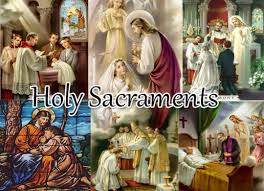
The Latin word sacramentum means “a sign of the sacred.” The seven sacraments are
ceremonies that point to what is sacred, significant and important for Christians.
They are special occasions for experiencing God’s saving presence. That’s what theologians
mean when they say that sacraments are at the same time signs and instruments of God’s grace.
If you learn more about the sacraments, you can celebrate them more fully. To learn more
about the individual sacraments, please follow the links below. You’ll find easy-to-understand
articles and a good sample of common questions and answers.
.jpg) Baptism
Baptism
For Catholics, the Sacrament of Baptism is the first step in a lifelong journey of commitment
and discipleship. Whether we are baptized as infants or adults, Baptism is the Church’s way of
celebrating and enacting the embrace of God. The word baptism in its origins is Greek and
means “immersion” and “bath.” Immersion in water is a sign of death and emersion out of the
water means new life. To bathe in water is also to undergo cleansing. Saint Paul sums up this
truth when he says, “You were buried with him in baptism, in which you were also raised with
him through faith in the power of God, who raised him from the dead” (Col 2:12).
 Eucharist
Eucharist
Catholics believe the Eucharist, or Communion, is both a sacrifice and a meal. We believe in the
real presence of Jesus, who died for our sins. As we receive Christ’s Body and Blood, we also are
nourished spiritually and brought closer to God. Recalling these words of Jesus, the Catholic
Church professes that, in the celebration of the Eucharist, bread and wine become the Body and
Blood of Jesus Christ through the power of the Holy Spirit and the instrumentality of the priest.
Jesus said: “I am the living bread that came down from heaven; whoever eats this bread will live
forever; and the bread that I will give is my flesh for the life of the world. . . . For my
flesh is true food, and my blood is true drink” (Jn 6:51-55). The whole Christ is truly present,
body, blood, soul, and divinity, under the appearances of bread and wine—the glorified Christ who
rose from the dead after dying for our sins. This is what the Church means when she speaks of
the “Real Presence” of Christ in the Eucharist.
 Reconciliation
Reconciliation
The Catholic Sacrament of Reconciliation (also known as Penance, or Penance and Reconciliation)
has three elements: conversion, confession and celebration. In it we find God’s unconditional forgiveness;
as a result we are called to forgive others.Jesus entrusted the ministry of reconciliation to the Church.
The Sacrament of Penance is God’s gift to us so that any sin committed after Baptism can be forgiven.
In confession we have the opportunity to repent and recover the grace of friendship with God. It is a
holy moment in which we place ourselves in his presence and honestly acknowledge our sins, especially
mortal sins. With absolution, we are reconciled to God and the Church. The Sacrament helps us stay close
to the truth that we cannot live without God. “In him we live and move and have our being” (Acts 17:28).
While all the Sacraments bring us an experience of the mercy that comes from Christ’s dying and rising,
it is the Sacrament of Reconciliation that is the unique Sacrament of mercy.
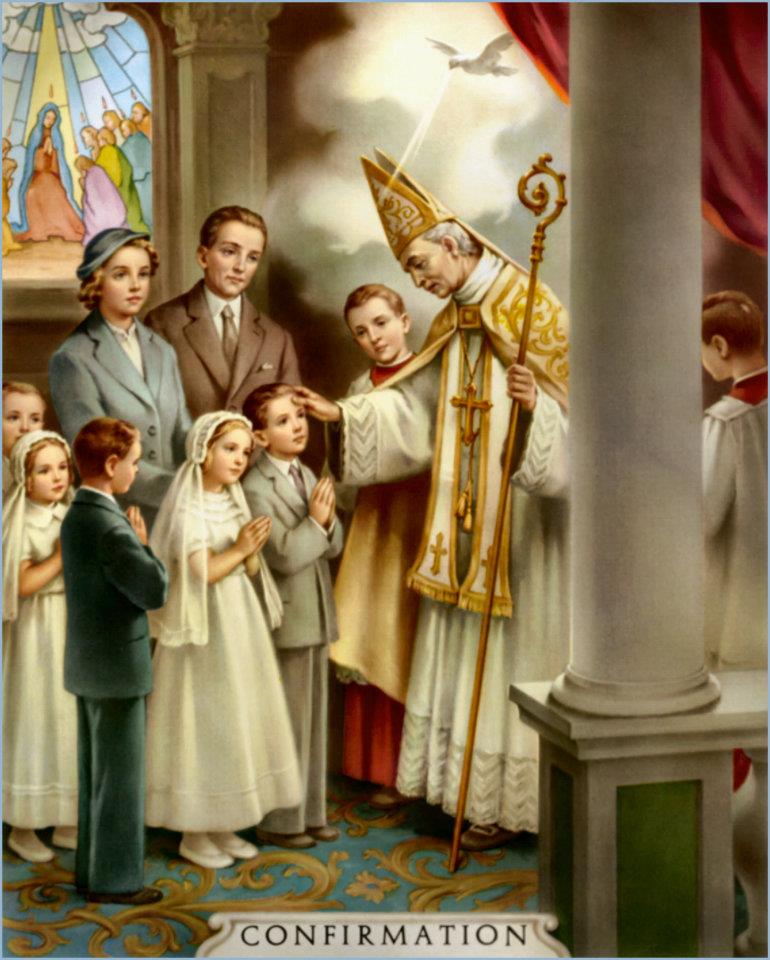 Confirmation
Confirmation
Confirmation is a Catholic Sacrament of mature Christian commitment and a deepening of baptismal gifts.
It is one of the three Sacraments of Initiation for Catholics. It is most often associated with the gifts
of the Holy Spirit.Confirmation, together with Baptism and Eucharist, form the Sacraments of Initiation
that are all intimately connected. In the Sacrament of Confirmation, the baptized person is “sealed with
the gift of the Holy Spirit” and is strengthened for service to the Body of Christ.
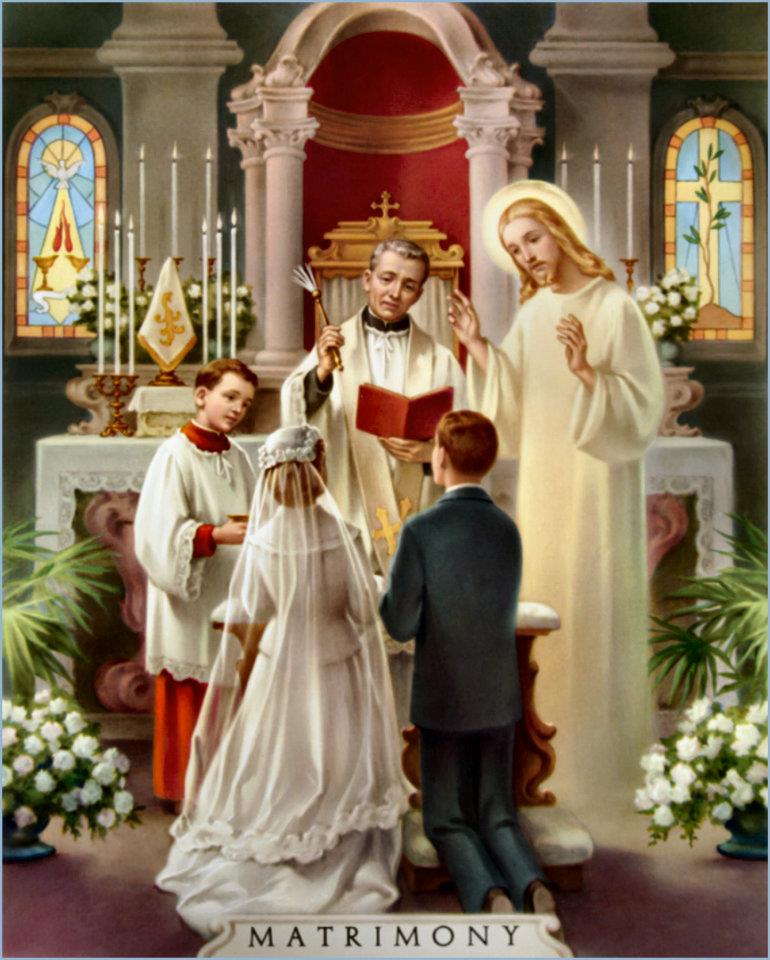 Marriage
Marriage
For Catholics, the Sacrament of Marriage, or Holy Matrimony, is a public sign that one gives oneself totally
to this other person. It is also a public statement about God: the loving union of husband and wife speaks
of family values and also God’s values.The Sacrament of Marriage is a covenant, which is more than a contract.
Covenant always expresses a relationship between persons. The marriage covenant refers to the relationship
between the husband and wife, a permanent union of persons capable of knowing and loving each other and God.
The celebration of marriage is also a liturgical act, appropriately held in a public liturgy at church.
Catholics are urged to celebrate their marriage within the Eucharistic Liturgy.
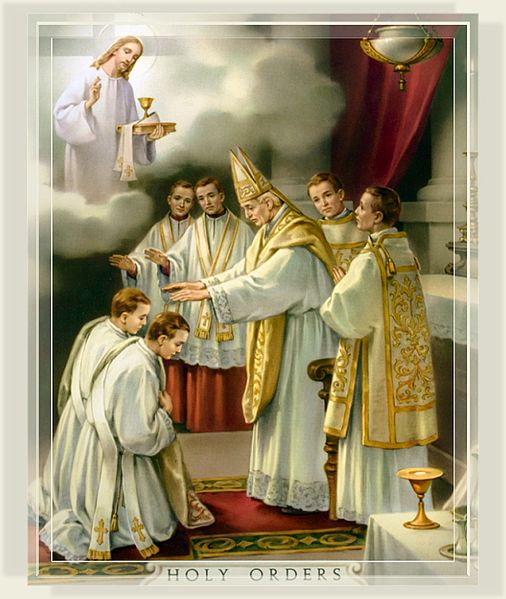 Holy Orders
Holy Orders
In the Sacrament of Holy Orders, or Ordination, the priest being ordained vows to lead other Catholics by bringing
them the sacraments (especially the Eucharist), by proclaiming the Gospel, and by providing other means to holiness.
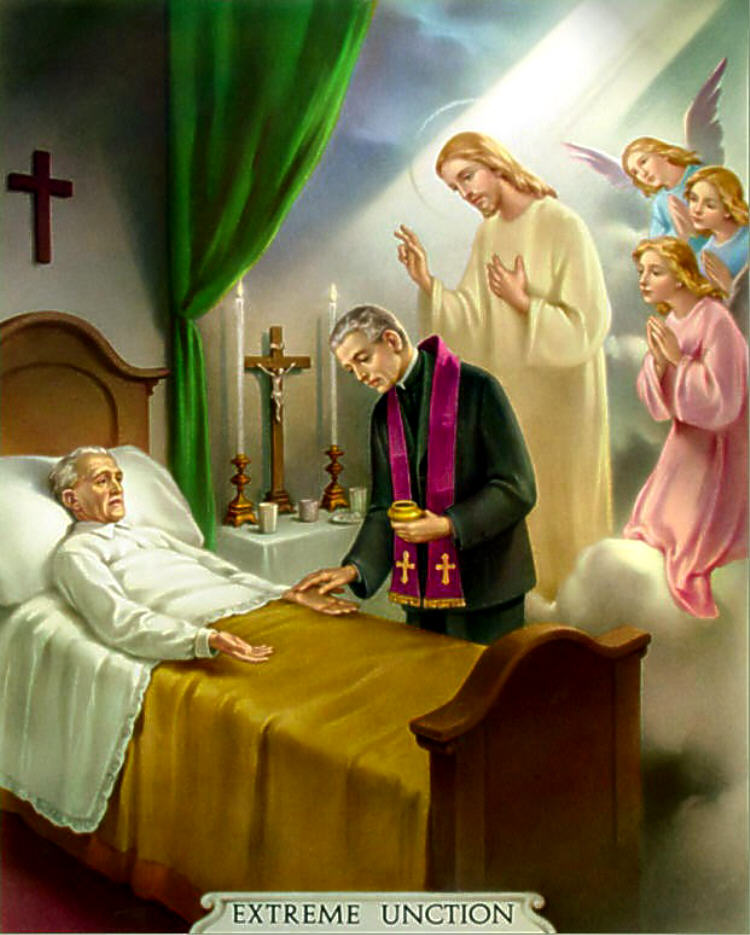 Anointing of the Sick
Anointing of the Sick
The Catholic Sacrament of Anointing of the Sick, formerly known as Last Rites or Extreme Unction, is a ritual of
healing appropriate not only for physical but also for mental and spiritual sickness.The Rite of Anointing tells
us there is no need to wait until a person is at the point of death to receive the Sacrament. A careful judgment
about the serious nature of the illness is sufficient.
[Provided by americancatholic.org]
Home


.jpg)





